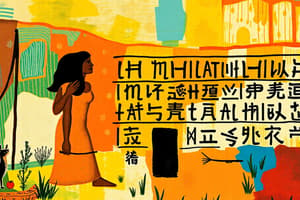Podcast
Questions and Answers
What does the term Mesopotamia mean?
What does the term Mesopotamia mean?
- Home of the city-builders
- Between rivers (correct)
- Land of fertile soil
- Area of abundant food
Which two rivers are associated with Mesopotamia?
Which two rivers are associated with Mesopotamia?
- Danube and Rhone
- Tigris and Euphrates (correct)
- Nile and Amazon
- Mississippi and Yangtze
What was one of the four main reasons the Mesopotamians settled in the valley between the rivers?
What was one of the four main reasons the Mesopotamians settled in the valley between the rivers?
- Mountainous terrain
- Abundant rainfall
- Water for drinking (correct)
- Isolation from other societies
How did the Mesopotamians benefit from the flooding of the rivers?
How did the Mesopotamians benefit from the flooding of the rivers?
What role did boats play for the Mesopotamians?
What role did boats play for the Mesopotamians?
What types of crops did the Mesopotamians grow?
What types of crops did the Mesopotamians grow?
Which of the following statements about Mesopotamian economy is true?
Which of the following statements about Mesopotamian economy is true?
What was a characteristic feature of Mesopotamian societies?
What was a characteristic feature of Mesopotamian societies?
What were ziggurats primarily used for in Mesopotamian cities?
What were ziggurats primarily used for in Mesopotamian cities?
Which materials were NOT commonly used in the construction of buildings in Mesopotamia?
Which materials were NOT commonly used in the construction of buildings in Mesopotamia?
What percentage of the population in a Mesopotamian city were farmers?
What percentage of the population in a Mesopotamian city were farmers?
Which of the following is true about the roles of women in Mesopotamian society?
Which of the following is true about the roles of women in Mesopotamian society?
Which group of people in Mesopotamian society held power and status?
Which group of people in Mesopotamian society held power and status?
What did Mesopotamians commonly export to other regions?
What did Mesopotamians commonly export to other regions?
What significant innovation did the Mesopotamians develop for their tools and weapons?
What significant innovation did the Mesopotamians develop for their tools and weapons?
What was one of the roles of ziggurat temples, aside from being places of worship?
What was one of the roles of ziggurat temples, aside from being places of worship?
Study Notes
Mesopotamia - The Cradle of Civilization
- Mesopotamia, located in modern-day Iraq, was a region between the Tigris and Euphrates rivers.
- Its early civilization flourished between 3500 BC and 1700 BC.
- River Advantages:
- Rivers provided fresh water for drinking and irrigation.
- They served as "water highways" for transportation using boats.
- Rivers attracted wildlife like birds and gazelles, providing food sources.
- Annual floods deposited fertile soil, ideal for agriculture.
- Agriculture & Farming:
- The fertile floodplains allowed for the growth of various crops like barley, wheat, onions, lettuce, chickpeas, turnips, cucumbers, grapes, apples, and melons.
- Agriculture and trade were the mainstays of the Mesopotamian economy.
- City-Building:
- Mesopotamians were pioneers in city building, constructing walled cities along the rivers.
- Buildings were made using mud bricks, crushed reeds, wood, and sometimes stone.
- Ziggurats: Step-pyramids dedicated to gods and goddesses, served as temples and centers of learning.
- Social Structure:
- Society consisted of three primary groups:
- Nobles: Royalty and religious officials.
- Commoners: Farmers, merchants, craftspeople, and palace staff.
- Slaves: Worked for the palace officials and constructed temples.
- Farming was the dominant occupation, with over 90% of the population engaged in agriculture.
- Society consisted of three primary groups:
- Women in Society:
- Women typically stayed at home, managing households, raising children, and participating in agricultural tasks like grain crushing.
- Wealthy women could engage in trade and participate in markets.
- Tools & Technology:
- Mesopotamians used advanced tools like saws, hammers, nails, chisels, pins, and braces.
- They developed weapons like swords, daggers, axes, knives, and clubs.
- Bronze, a stronger metal than stone, was used to create tools and weapons.
- Religion & Beliefs:
- Each city was believed to be protected by a specific deity.
- Ziggurats were seen as connecting heaven and earth, serving as centers for religious events and learning.
- Inventions and Achievements:
- Mesopotamians were renowned for their numerous inventions and achievements, contributing significantly to the development of human civilization.
Studying That Suits You
Use AI to generate personalized quizzes and flashcards to suit your learning preferences.
Related Documents
Description
Explore the ancient civilization of Mesopotamia, situated between the Tigris and Euphrates rivers. Discover how agriculture, river advantages, and city-building contributed to its prosperity from 3500 BC to 1700 BC. Test your knowledge of this foundational period in human history.




